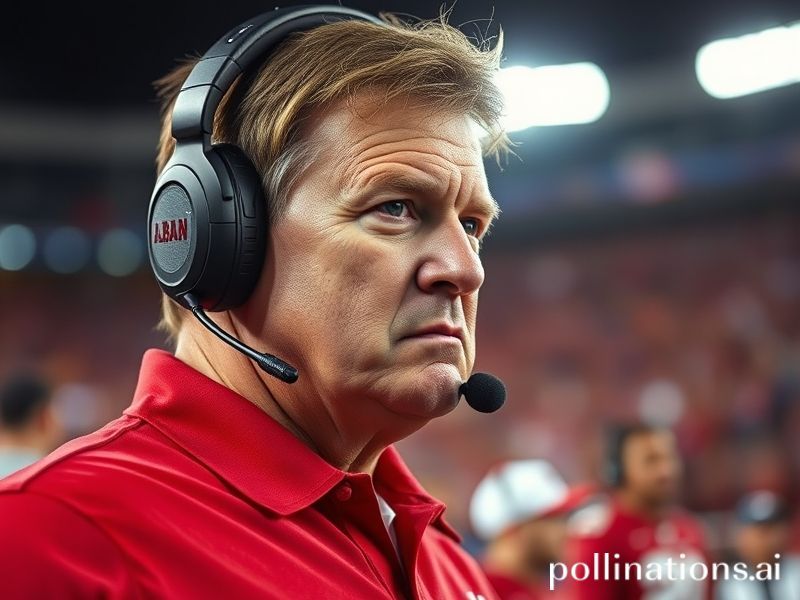Nick Saban Retires: How an Alabama Dynasty Explains the Global Economy, Soft Power, and Human Absurdity
Nick Saban, American Caesar of the Gridiron, Retires—And the World Somehow Keeps Spinning
By Helena Draxler, Senior International Correspondent | Dave’s Locker
PARIS—While glaciers melt, supply chains choke, and half the planet queues for a passport that still means something, the United States paused yesterday to rend its garments over the retirement of a 72-year-old football coach. Nick Saban, the man who turned the University of Alabama into a small, well-funded nation-state with better defense spending than most NATO members, is stepping away from the headset and into that great gated community in the sky we call “emeritus status.”
To the uninitiated outside the 50 states, Saban is the chap who won seven national titles, six of them in Tuscaloosa, a town whose name foreigners usually mispronounce as “Tuscany” until they see the Walmart. His Crimson Tide machine has been so ruthlessly efficient that the International Olympic Committee briefly considered adding “Alabama vs. The Field” as an exhibition sport, if only to give the rest of college football a participation ribbon.
Yet the global significance of Saban’s abdication is not the silverware but the template: a sovereign, spectacle-driven economy built on unpaid labor, television lucre, and a quasi-religious mythos. In other words, the exact export package America has been pitching to the world since 1945, only now with a marching band.
Across the Atlantic, where football is played with feet and oligarchs launder reputations via Premier League clubs, Saban’s exit triggered mild bewilderment. “He never bought a super-yacht or threatened to nuke a broadcaster,” noted a puzzled editor at L’Équipe. “What kind of sports baron is this?” The Chinese internet, meanwhile, lit up with memes comparing Saban’s recruiting prowess to Beijing’s ability to secure rare-earth minerals: both involve lavish inducements, satellite campuses, and the occasional sacrifice of academic integrity.
Down in Brazil, where the Seleção’s last World Cup humiliation still festers like a tropical rash, pundits wondered whether Saban’s “Process” could be franchised to the national team. Imagine: 4 a.m. wind sprints on Copacabana, curfews enforced by linebackers nicknamed “Carnaval Cancelers.” The samba would be replaced by a militarized metronome—yet somehow the trophy drought would end.
Not everyone is amused. In Davos-adjacent chatrooms, Saban’s retirement is filed under “talent supply-chain disruption.” Goldman Sachs reportedly ran a Monte Carlo simulation on the macro impact: without Alabama’s annual playoff run, television advertising drops 0.7 percent, bourbon futures wobble, and the entire southeastern United States considers secession—again. Crypto speculators have already minted the “SABAN” token, because nothing says immortality like a JPEG of a visor that expires when the server bill goes unpaid.
Human-rights types, ever the life of the party, point out that Saban leaves behind a plantation economy in shoulder pads. Athletes generate billions yet can’t monetize their own name without a compliance officer’s blessing. FIFA, never missing a chance to look ethical by comparison, issued a statement praising “amateurism’s noble tradition.” Sepp Blatter’s ghostwriters are nothing if not ironic.
And what of Saban himself? He departs citing “time to smell the roses,” which in Alabama is less horticultural than hortatory: translate it as “I’ve secured the bag, and my statue outside the stadium is taller than most mayors.” Expect him to resurface on a studio set, offering geopolitical hot takes between Mazda commercials: “If you don’t control the line of scrimmage, China controls the South China Sea.”
The broader lesson for the planet is that modern power no longer requires an army—just a headset, a playbook, and the soft tyranny of a 5-star rating system. From Silicon Valley to Riyadh, autocrats study Saban’s recruiting tapes the way 19th-century generals studied Napoleon’s marches. The difference is Napoleon never had to worry about the transfer portal.
So the world spins on, indifferent to the fact that a man who once made teenagers cry over a missed tackle now plans to spend more time with his boat. Somewhere, a Ukrainian artillery crew pauses between shellings to check whether the Crimson Tide’s offensive coordinator is following them on Instagram. The absurdity is the point.
In the end, Nick Saban’s retirement confirms the oldest international truth: empires fall, borders shift, but somewhere a marching band will still play “Sweet Home Alabama” while the rest of humanity scrambles for tickets to whatever circus is next.







